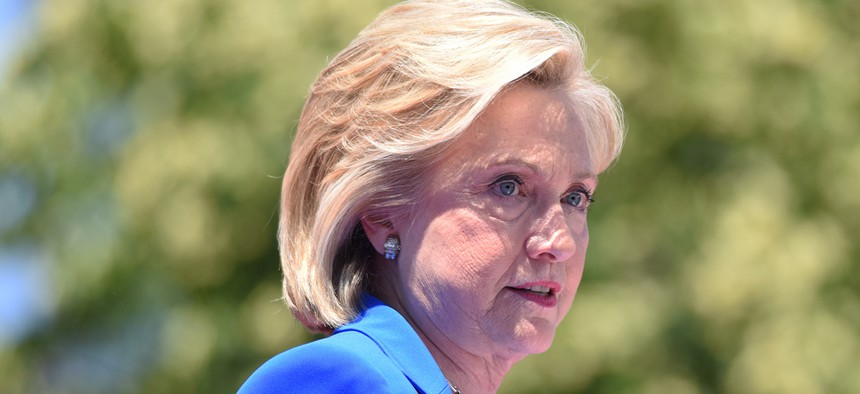
a katz / Shutterstock.com
Clinton Opposes Arctic Drilling Plan
The 2016 Democratic front-runner voices opposition after Shell gets federal approval to drill in icy waters.
A day after the Obama administration gave Shell the green light to search for oil in icy Arctic waters, Hillary Clinton took to Twitter to voice her disapproval.
A spokesman for the Clinton campaign confirmed to National Journal that Clinton's tweet indicates that she opposes Arctic offshore oil-drilling.
The Arctic is a unique treasure. Given what we know, it's not worth the risk of drilling. -H
— Hillary Clinton (@HillaryClinton) August 18, 2015Her announcement drew quick criticism from Jeb Bush, one of the major candidates for the GOP presidential nomination, a sign that energy policy will be a political battleground in the 2016 election.
"Wrong," Bush said on Twitter in response to Clinton. "Being more-anti energy than Obama is extreme. We should embrace energy revolution to lower prices & create US jobs."
But Clinton's definitive stand is sure to please environmentalists who want the Democratic front-runner to take a tougher line on fossil-fuel development than President Obama has—who, despite making action to tackle climate change a key priority, has long voiced support for an "all of the above" energy strategy.
The Sierra Club was quick to applaud Clinton while keeping pressure on the 2016 contender to translate her words into concrete action. "We applaud Secretary Clinton for standing up for what science, the will of the American people and common sense demand," Sierra Club executive director Michael Brune before calling on the next president to deny "Shell's application to commercially drill in the Arctic."
In July, Clinton expressed "doubts" over Arctic drilling, saying, "I don't think it is a necessary part of our overall clean-energy climate-change agenda," in an interview with NH1 News.
But the 2016 contender's silence on hot-button environmental issues, such as whether the controversial Keystone XL oil-sands pipeline should be approved, has frustrated environmentalists who fear that she will not do enough to rein in the greenhouse gases that scientists say are driving global warming.
Questions over where exactly Clinton stands on Arctic drilling have also proved to be a sore subject in the campaign's relationship with the climate movement.
Clinton has also long opposed onshore drilling for oil in the Arctic National Wildlife Refuge.
The candidate's democratic 2016 challengers on the Left, Bernie Sanders and Martin O'Malley, both oppose Arctic drilling.
But Clinton's comment nevertheless marks a key break with Obama, whose Interior Department this week gave long-sought permission to Shell to drill into oil-bearing zones in the Chukchi Sea off Alaska's northern coasts. The company had already begun preliminary drilling work.
Federal regulators estimate that the Chukchi Sea could hold more than 15 billion barrels of recoverable oil and large natural-gas resources, too. And the adjoining Beaufort Sea is believed to have huge subsea hydrocarbon pools, too.
But green groups strongly oppose drilling in the Arctic region, which is home to polar bears, bowhead whales, and other endangered or fragile species, arguing that it's too difficult to contain potential spills despite Shell's claim of robust safety and response measures.
Beyond long-standing fears over the potential for a catastrophic spill, the Arctic drilling fight has more recently become part of a much broader battle over climate change.
In May, environmental activist and founder of the grassroots green group 350.org Bill McKibbenslammed Obama's decision to let Shell drill for Arctic oil in a New York Times op-ed, calling it another form of "climate denial."
"The Obama administration's decision to give Shell Oil the go-ahead to drill in the Arctic shows why we may never win the fight against climate change. Even in this most extreme circumstance, no one seems able to stand up to the power of the fossil-fuel industry. No one ever says no," McKibben wrote.
While Shell is the only company currently drilling offshore in the U.S. Arctic, Clinton's stance will likely have broader effects on the industry if elected. Companies including ConocoPhillips and Statoil hold Arctic offshore leases that they have not yet sought to develop.
However, the Democratic front-runner's campaign provided no details about specific policies that would flow from ber broadly stated opposition, such as whether Shell might be able to proceed with its existing development plans in a Clinton administration.
Obama's Arctic offshore policies have sought to blend new protections with limited development.
The Interior Department is crafting new oil-spill prevention and response rules for companies operating in Arctic waters off Alaska's coast.
New Arctic lease sales are tentatively scheduled in 2016 and 2017, and a draft Interior Department plan released early this year also envisions auctions of drilling rights in Arctic waters in 2020 and 2022. However, Obama has also placed major areas of the Arctic seas off-limits.
(Image via a katz / Shutterstock.com )






